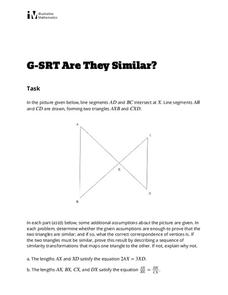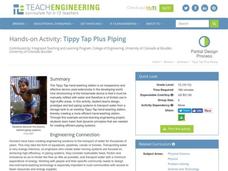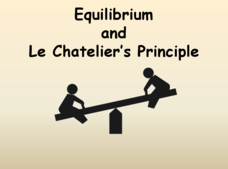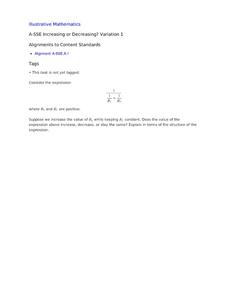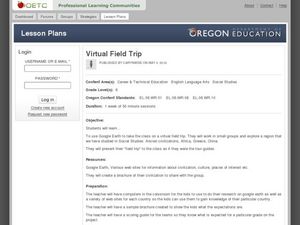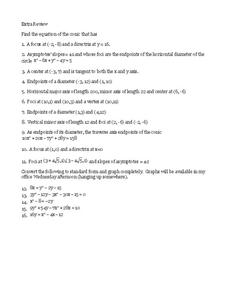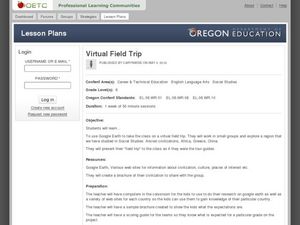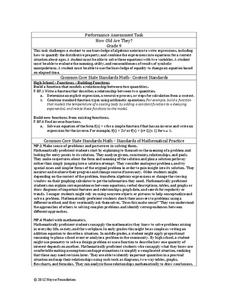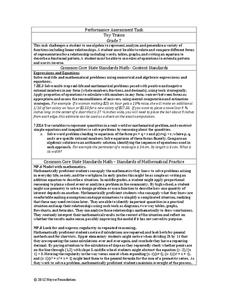Science Geek
Nuclear Chemistry
Which bichemicals wash up on shore? Nucleotides! Presentation covers alpha, beta, and gamma radiation. Includes a comparison of fission versus fusion. Presentation is the second in a five-part series.
California Education Partners
Miguel's Milkshakes
Moooove over, there's a better deal over there! The fourth segment in a series of eight requires individuals to determine the best unit cost for milk. Scholars calculate the least amount they can spend on a particular quantity of milk....
Noyce Foundation
Building Blocks
Building blocks have more uses than simply entertaining children. Young mathematicians calculate the volume of a given cube, and then calculate the volume and surface area of a prism formed from multiple cubes.
NASA
What's the Frequency, Roy G. Biv?
While all light travels at the same speed, each color in the visible light spectrum contains a different wavelength and frequency. Scholars determine the relationship between frequency and wavelength as they complete the activity. They...
Illustrative Mathematics
Are They Similar?
Learners separate things that just appear similar from those that are actually similar. A diagram of triangles is given, and then a variety of geometric characteristics changed and the similarity of the triangles analyzed. Because the...
Teach Engineering
Tippy Tap Plus Piping
Getting water to a tap requires an understanding the fundamentals of fluid flow. Groups design, build, and test a piping system to get water from the source — a five gallon bucket — to a tippy tap. The objective is to be able to fill...
California Education Partners
Summer Olympics
Quickly get to the decimal point. The last assessment in a nine-part series requires scholars to work with decimals. Pupils compare the race times of several athletes and calculate how much they have improved over time. During the second...
Science Geek
Equilibrium and Le Chatelier's Principle
Time to shake up the status quo with a presentation that describes Le Chatlier's Principle and has pupils examine situations in which equilibrium is upset. Four examples show different stresses to the reaction and the resulting shift.
Curated OER
Increasing or Decreasing? Variation 1
Your algebra learners analyze the value of an algebraic expression to decide if it will increase, decrease, or stay the same when one variable is changed as the others stay constant. Their collaborative efforts culminate with a written...
Virginia Polytechnic Institute and State University
Lesson Plan: Omelet Cooking Principles
Although designed for a foods lab, the information in this resource might be just the thing for your own recipe notebook. Illustrated, step-by-step directions for making the perfect omelet, egg-citing puzzles, games, and even...
Curated OER
Virtual Field Trip
Are we there yet? Young trip planners learn about their state and plan a trip. They will select sites to see in three cities in their state, and record associated costs in a spreadsheet. While this was originally designed as a...
Curated OER
Graphs and Equations of Conic Sections Practice Test
In this conic section worksheet, learners complete a thirty-one question practice test containing matching and problem solving conic equation and conic graph problems. The solutions are provided.
Curated OER
Slopey Math
Students identify the slope of a line and use it to solve real life problems. In this algebra activity, students write linear equations in slope intercept form and make a correlation to its relation to the real world. They use the slope...
Curated OER
Scientific Notation
For this scientific notation worksheet, students first write a set of 10 equations and answers in standard form, then another set of 10 in scientific notation.
Curated OER
Eccentricity of Conic Sections
In this conic sections worksheet, 11th graders solve and complete 26 various types of problems. First, they identify the eccentricity of each equation shown. Then, students use the information provided to write the standard form equation...
Curated OER
Using Tables to Solve Linear Functions
Oh that intercept! Budding algebra masters solve linear equations from standard to intercept form. They identify the slope and y-intercept to help graph the lines, an then create coordinate pairs using a table of values. Great TI tips...
Curated OER
Conics
In this conic sections worksheet, 11th graders solve and complete 16 different types of equations. First, they find the equation of the conic that has a given focus and directrix. Then, students convert each given polynomial to standard...
Curated OER
Properties of Parabolas
Learn to identify the properties of parabolas. Students define parabola as the locus of all points equidistant from a fixed point and a fixed line. Also, interpret the equation for a parabola in vertex form and gain a visual...
Curated OER
EOC Review G
In this end of course review, students factor expressions, interpret statistic problems, and identify the maximum and minimum of equations. This two-page worksheet contains 5 multi-step problems.
Curated OER
Solve Four Systems of Equations Using Inverse Matrices
For this inverse matrices worksheet, students solve four systems of equations using inverse matrices. Examples and explanations are provided.
Curated OER
Solving Quadratic Equations by Graphing
Students solve quadratic equation by graphing. For this algebra lesson, students use the TI calculator to get a visual of their graph. They create a table of values, plot their points and graph the parabola.
Curated OER
Virtual Field Trip
This hands-on resource has future trip planners analyze graphs of mileage, gasoline costs, and travel time on different routes. While this was originally designed for a problem-solving exercise using a Michigan map, it could be used as a...
Inside Mathematics
How Old Are They?
Here is a (great) lesson on using parentheses! The task requires the expression of ages using algebraic expressions, including the distributive property. Pupils use their expressions to determine the individual ages.
Noyce Foundation
Toy Trains
Scholars identify and continue the numerical pattern for the number of wheels on a train. Using the established pattern and its inverse, they determine whether a number of wheels is possible. Pupils finish by developing an algebraic...






